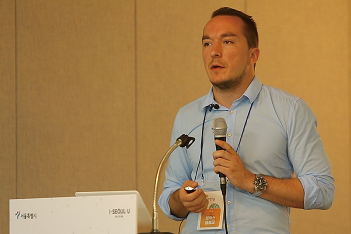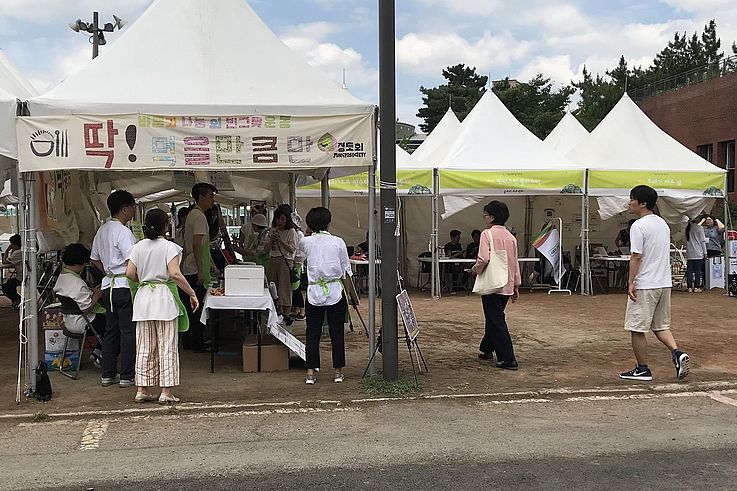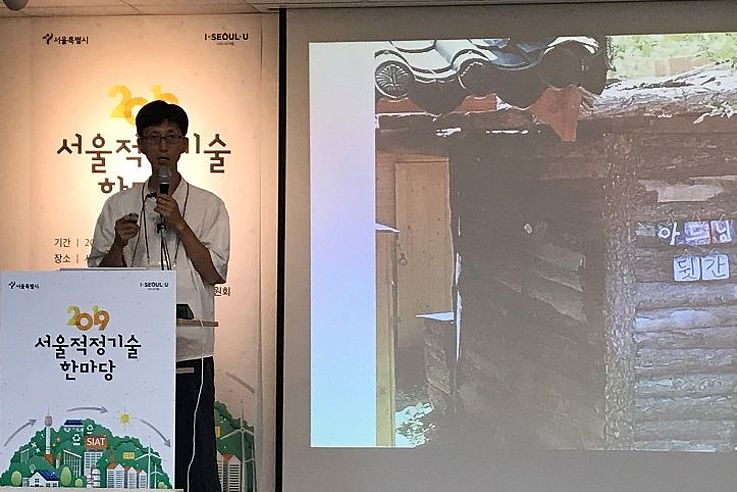Festival
Promoting a Sustainable Lifestyle through Innovation
The 2019 SIAT Festival took place at Seoul Innovation Park, which serves as a platform for Seoul´s citizens to meet, talk and create. Throughout the year cultural programs, events, and activities take place bringing people together. There, communities can gather support for their projects, that focus on social and environmental aspects in Seoul. The third day of the festival focused on energy-independent opportunities for environmentally friendly self-sufficiency. HSF has been supporting various environmental and agricultural projects in North Korea for several years. Hence, Felix Glenk, Project Manager for DPR Korea, presented on current developments and challenges in North Korea emphasizing the importance of international cooperation for nature conservation.

Felix Glenk presenting on HSF projects in North Korea.
In North Korea, the issue of sustainability is of particular interest, as the country has important biodiversity, yet lacks reliable energy supply and suffers from environmental issues. Coastal wetlands, which have massively declined over the last decades, are the preferred habitat for migratory birds along the Yellow Sea and on the East Asian - Australasian Flyway, demanding long-term preservation measures. Additionally, the country has suffered from massive deforestation due to energy shortages and steep slopes in agriculture, which in turn has led to erosion. The results are annual floods that destroy entire villages. Moreover, outdated technology and poor infrastructure can lead to environmental pollution and inefficient agriculture continues to be a problem since it is still mostly done manually with intense labor force. However, awareness has developed in recent years whereby environmental initiatives are on the rise. HSF Korea supports the processes of sustainable development and nature conservation through educational work, expertise, and training to support North Korea as a partner of the global network and, thus contributes to long-term environmental protection.
A second presentation, held by Mr. Park Young-ho, introduced an ecologic community, which has developed a self-sufficient lifestyle under environmental terms. Promoting sustainable production, the community manufactures its own houses made of natural materials, ecological toilet systems and grows its own food. Solar panels guarantee steady and sufficient energy supply. Another goal is to minimize waste products through recycling. The focus of this project is to reflect on individual consumer behavior, which can have a significant impact on nature conservation.
Finally, Ms. Kim So-young presented the Seongdaegol Energy Village, an urban project from Seoul that started in 2011 and has become a model for sustainable living ever since. Under the slogan "Innovation becomes Life", people have joined forces to make urban life more sustainable. The focus is on energy saving as opposed to energy production. Given that Seoul is densely populated the installation of large solar systems is almost impossible. Yet, in 2012, the movement introduced a handy version of small solar panels that are both portable and space-saving and can fit on small balconies. The idea, which was subsidized by the city to the tune of $20,000, is slowly developing into a nationwide project. The success story is based on self-reflection and inventiveness which are crucial aspects of innovation in support of a sustainable lifestyle.


